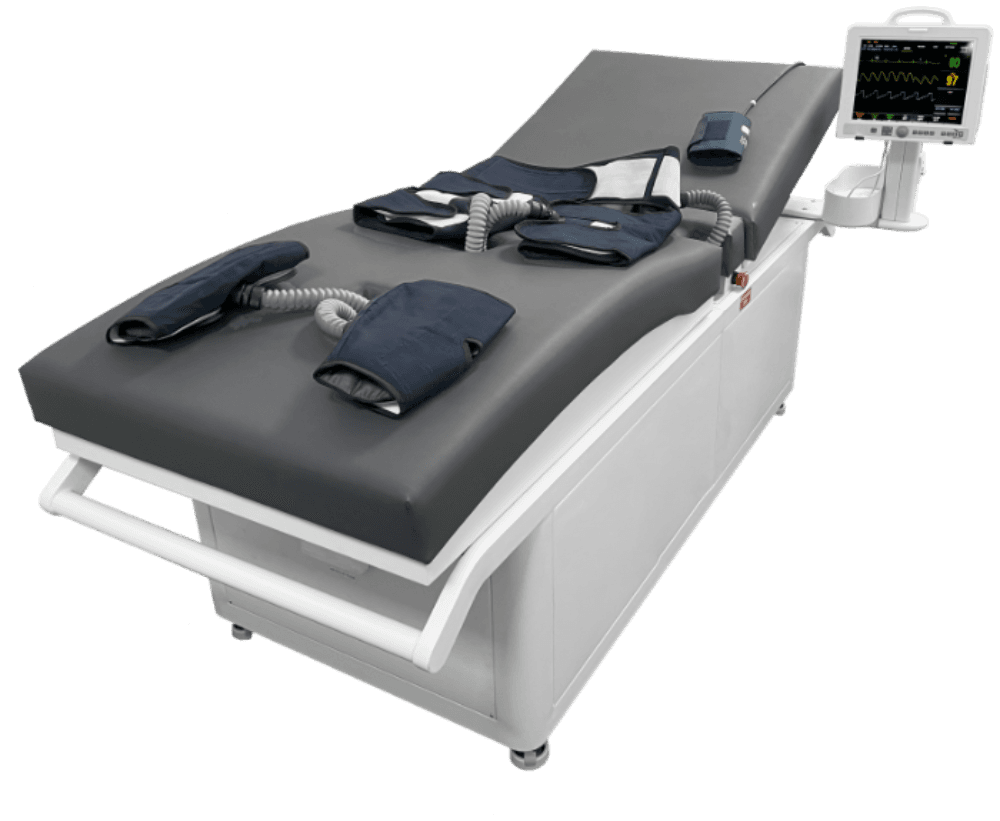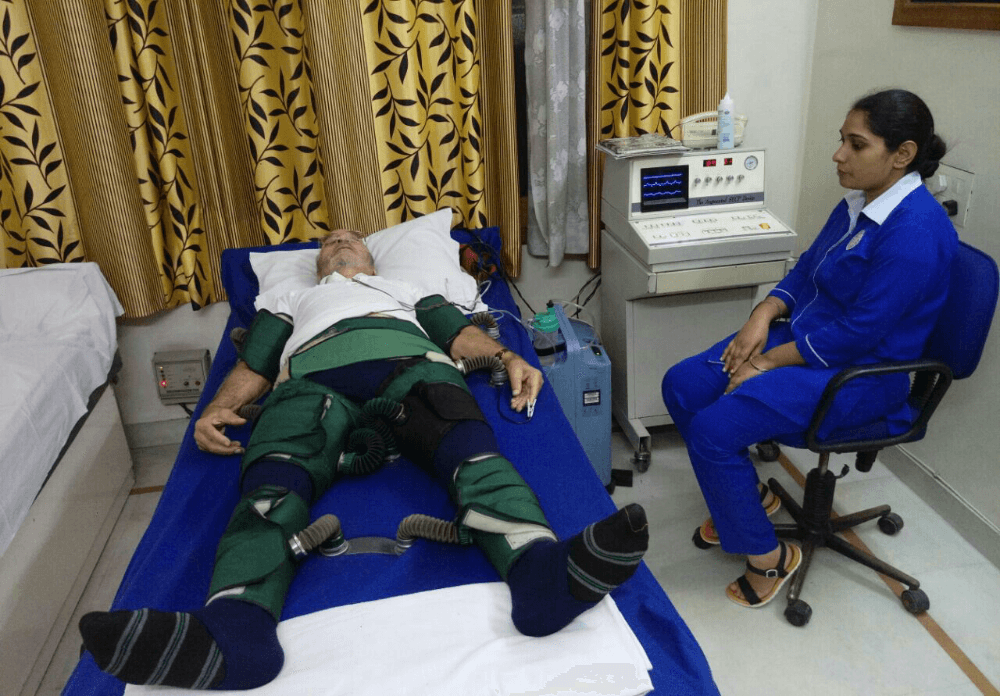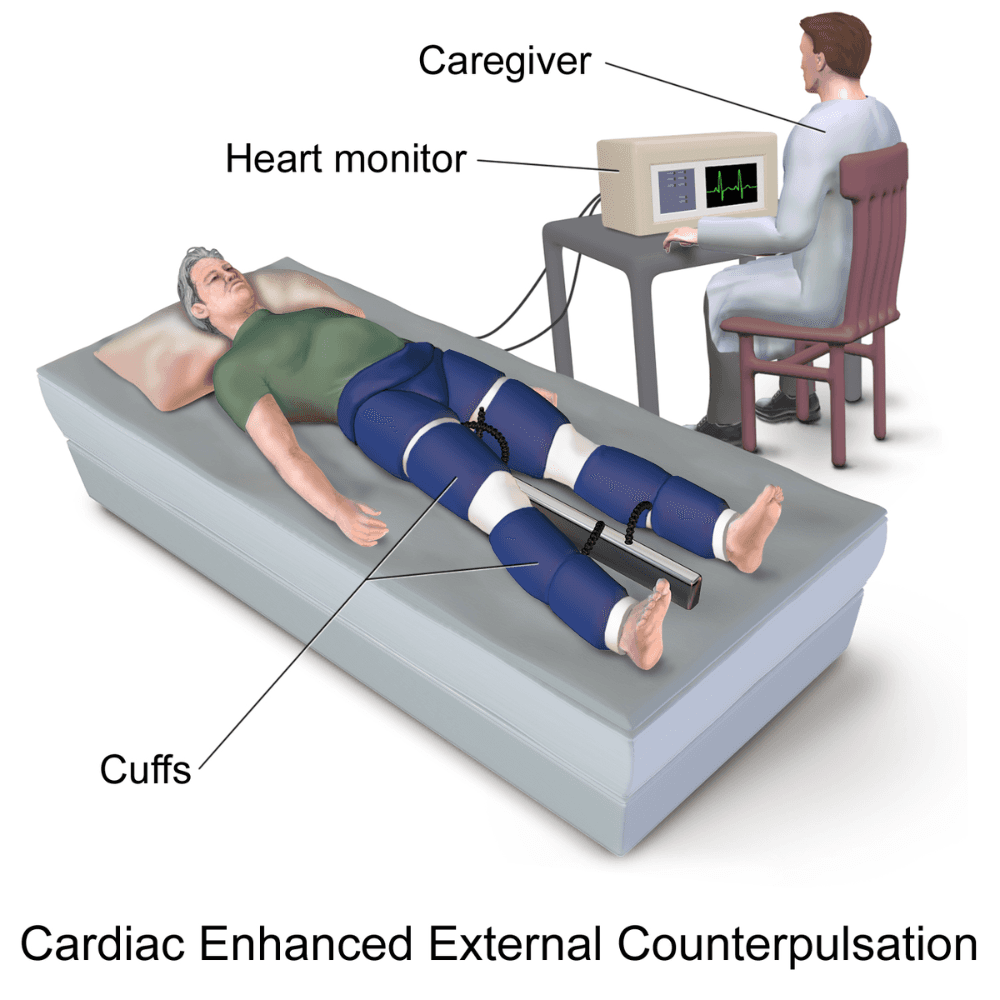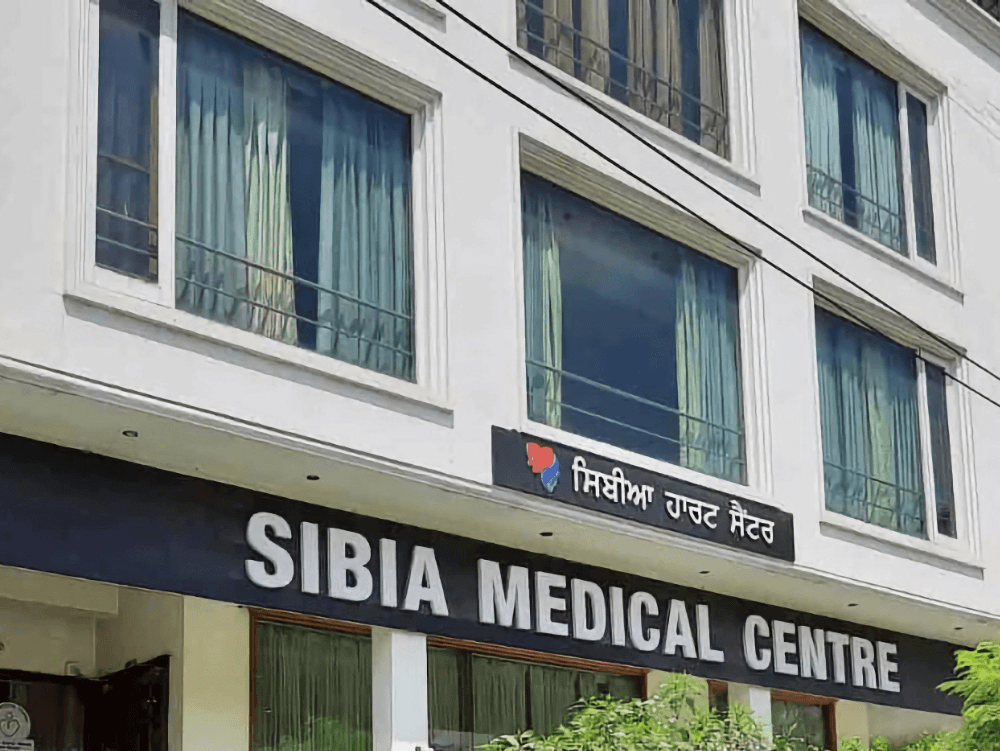EECP Therapy: Is It Right for You? A Guide for Cardiac Patients in India
Author
Dr. Ilmjot Sibia
Vice-President at Sibia Medical Centre
Published On
2 Jan 2025
If you’ve been struggling with chest pain from angina or managing chronic heart conditions, you may have come across Enhanced External Counter Pulsation (EECP) therapy. This non-invasive treatment has transformed how we approach heart disease, offering relief and improved blood flow to the heart without surgery. In this blog, we’ll explore how EECP therapy works, its benefits and costs, and why Sibia Medical Centre, pioneers of EECP treatment in India, should be your go-to choice.
Key Takeaways
EECP Therapy is an FDA-approved, non-invasive treatment for angina and heart failure. Enhanced External Counter Pulsation (EECP) involves inflatable cuffs around the legs and buttocks that inflate and deflate to improve blood flow to the heart, thereby increasing oxygen supply and alleviating chest pain.
It improves blood flow to the heart, alleviates symptoms of angina, and boosts quality of life for patients with coronary artery disease.
The cost of EECP treatment in India is much lower than that of bypass surgery or angioplasty, and the benefits last for years.
Sibia Medical Centre, a pioneer in introducing EECP therapy in India, offers specialized care for cardiac patients.
What is EECP Therapy?
Enhanced external counterpulsation (EECP) therapy is a non-invasive treatment for angina and heart failure designed to improve blood flow and restore oxygen supply to the heart. By using external inflatable cuffs that inflate and deflate in sync with your heart’s rhythm, EECP therapy enhances circulation and alleviates chest pain caused by restricted arteries.

This innovative therapy is often called the “natural bypass” because it helps create alternate pathways for blood flow to the heart. For those who may not qualify for invasive procedures, EECP therapy offers a safe, effective alternative.
How EECP Therapy Works
Enhanced external counterpulsation (EECP) therapy is a cutting-edge, non-invasive treatment designed to improve blood flow to the heart. The procedure involves using specialized inflatable cuffs, guided by an ECG, which inflate and deflate rhythmically in sync with the cardiac cycle. During each heartbeat, this action enhances blood flow and creates a “natural bypass” by promoting the development of new blood vessels, improving oxygen supply to the heart. Unlike surgical interventions, EECP therapy is painless, performed in an outpatient setting, and requires no recovery time, making it an innovative and patient-friendly solution for managing heart conditions like angina and heart failure.

The Role of Inflatable Cuffs
The procedure, known as enhanced external counterpulsation (EECP), involves inflatable cuffs wrapped around the patient’s legs and sometimes arms. These cuffs inflate and deflate rhythmically during different phases of the cardiac cycle. Controlled by advanced equipment and synchronized with the patient’s ECG, this process boosts blood flow to the heart and relieves pressure on the left ventricle.

Enhanced Circulation
The enhanced external counterpulsation therapy involves the inflation and deflation of cuffs around the legs and buttocks, which improves coronary perfusion, enabling increased blood flow and oxygen supply to the heart. This mechanism also stimulates the release of nitric oxide, promoting vasodilation and reducing angina symptoms.
EECP Therapy Schedule
Enhanced external counterpulsation (EECP) therapy typically involves 35 one-hour sessions over seven weeks. Patients often start noticing significant improvements in symptoms after two to four weeks, with effects lasting for 5 to 10 years.
Benefits of EECP Therapy
Enhanced external counterpulsation (EECP) therapy is a non-invasive treatment designed to address chronic stable angina and heart failure effectively. By improving blood flow to the heart, this therapy not only alleviates chest pain but also supports long-term cardiovascular health. Patients with angina or heart failure often experience significant improvements in their symptoms, making EECP therapy a valuable alternative to traditional invasive procedures. Let’s explore the key benefits of EECP therapy, starting with its remarkable impact on blood flow.
Improved Blood Flow - EECP therapy enhances blood flow to the heart, reducing angina symptoms and boosting overall cardiovascular health.
Enhanced Quality of Life - Patients report better exercise capacity, less fatigue, and improved ability to perform daily activities.
Cost-Effectiveness - Compared to bypass surgery, the cost of EECP treatment is significantly lower, making it accessible to a broader range of patients.
Non-Invasive and Safe - Unlike invasive procedures, EECP therapy is a non-invasive treatment with minimal side effects, offering a quicker recovery.
Success Rates of EECP Treatment
The success rates of EECP treatment are impressive, particularly for patients with coronary artery disease (CAD). Clinical studies have shown that EECP therapy can significantly improve symptoms, increase exercise tolerance, and reduce the frequency of angina episodes. Patients often report enhanced overall cardiovascular health and a better quality of life. While individual results may vary based on the severity of the condition, the overall safety and efficacy of EECP treatment make it a valuable option for managing heart disease. This non-invasive therapy continues to gain recognition for its ability to provide lasting relief and improve patient outcomes.
Eligibility for EECP Therapy
Not everyone is eligible for enhanced external counterpulsation (EECP) therapy. Ideal candidates include:
Patients with chronic stable angina who cannot undergo bypass surgery or angioplasty.
Those with heart failure or other cardiovascular conditions seeking non-invasive alternatives.
Patients who have not responded well to other treatments.
Before beginning the course of EECP therapy, a consultation with a specialist is essential. At Sibia Medical Centre, experienced professionals evaluate your health to determine if this treatment is right for you.
Pre-EECP Treatment Preparation
Preparing for EECP treatment involves several important steps to ensure the best possible outcomes. First, patients should consult with their cardiologist to determine if EECP therapy is suitable for their condition. It’s crucial to discuss any medications being taken and disclose any existing medical conditions. A pre-treatment evaluation will be scheduled to assess overall health and tailor the treatment plan accordingly. Patients should follow any specific instructions provided by their doctor or the EECP treatment center, such as dietary guidelines or activity restrictions, to optimize the effectiveness of the therapy.
Potential Side Effects of EECP Therapy
While enhanced external counterpulsation (EECP) therapy is generally safe, some patients may experience:
Discomfort from the cuffs during inflation and deflation.
Muscle soreness or mild fatigue after sessions.
Skin irritation or redness where the cuffs are applied.
These side effects are typically minor and resolve quickly. At Sibia Medical Centre, the treatment process is carefully monitored to ensure maximum comfort and safety.
EECP Treatment Cost in India
The cost of enhanced external counterpulsation (EECP) treatment in India ranges from ₹70,000 to ₹1,20,000 for a 35-day course, depending on the facility and location. At Sibia Medical Centre, you’ll receive top-notch care at competitive prices, making it an excellent value compared to bypass surgery or angioplasty.
EECP Treatment Cost Comparison with Other Countries
One of the significant advantages of EECP treatment in India is its affordability compared to other countries. In India, the cost of a 35-day EECP treatment course ranges from ₹70,000 to ₹1,20,000, making it accessible to a broader range of patients. In contrast, the same treatment in the United States can cost between $8,000 and $12,000, while in the United Kingdom, it ranges from £6,000 to £10,000. This substantial cost difference highlights the value of seeking EECP treatment in India, where patients can receive high-quality care at a fraction of the price.
Comparing EECP Therapy with Other Treatments
When it comes to managing angina and heart failure, enhanced external counterpulsation (EECP) therapy stands out as a safe and cost-effective alternative to invasive procedures like bypass surgery and angioplasty. Enhanced External Counterpulsation is a non-invasive treatment that improves blood flow to the heart without the risks and recovery times associated with traditional methods. By focusing on enhancing circulation naturally, EECP therapy provides patients with a minimally disruptive option to regain their quality of life while avoiding the complications often linked to surgical interventions. Let’s dive deeper into how EECP compares with other common treatments.
EECP vs. Bypass Surgery
EECP is a non-invasive treatment with fewer complications and no hospital stay.
Bypass surgery involves significant risks, higher costs, and longer recovery times.
EECP vs. Angioplasty
Angioplasty requires stent placement, which can lead to complications.
EECP therapy offers a natural alternative by improving circulation without surgery.
Choosing a Hospital for EECP Treatment in India
Selecting the right hospital for EECP treatment in India is crucial for ensuring safe and effective care. Patients should prioritize hospitals with experienced cardiologists and a strong reputation for successful EECP treatments. It’s essential to research the hospital’s track record, including patient reviews and success rates. Additionally, consider the cost of treatment and the hospital’s location for convenience. Facilities equipped with advanced medical technology and focused on patient-centered care will provide the best environment for undergoing EECP therapy.
How to Select a Hospital for EECP Treatment
When choosing a hospital for EECP treatment, consider the following factors to make an informed decision:
Experience and Qualifications: Ensure the cardiologists have extensive experience and relevant qualifications.
Reputation: Look for hospitals with positive patient reviews and a good reputation in cardiac care.
Success Rate: Check the hospital’s success rate for EECP treatments.
Cost of Treatment: Compare the cost of EECP therapy at different hospitals to find one that fits your budget.
Location: Choose a hospital that is conveniently located for easy access.
Advanced Medical Equipment: Ensure the hospital is equipped with the latest medical technology.
Quality of Patient Care: Consider the overall quality of patient care and support services provided.
By evaluating these factors, patients can select a hospital that meets their needs and ensures a safe and effective EECP treatment experience.
Why Choose Sibia Medical Centre for EECP Treatment?

Sibia Medical Centre has been a trailblazer in introducing EECP therapy in India since the early 2000s. With state-of-the-art facilities and a team of dedicated professionals, they ensure personalized care for every patient. Here’s what sets them apart:
Extensive expertise in administering enhanced external counterpulsation therapy.
A patient-centered approach focused on comfort and safety.
Affordable EECP therapy costs with no compromise on quality.
FAQs on EECP Therapy
Q1. What is EECP Therapy?
Enhanced external counterpulsation (EECP) therapy is a non-surgical treatment designed to improve blood flow to the heart, reduce chest pain, and enhance the quality of life for patients with heart conditions.
Q2. History of EECP Treatment
Enhanced External Counterpulsation (EECP) therapy has a rich history dating back to the early 1960s in China. The initial concept involved using inflatable cuffs around the legs to enhance blood flow to the heart. These cuffs were designed to inflate during the heart’s resting phase and deflate during contraction, effectively aiding circulation. Over the decades, EECP treatment has evolved significantly, becoming a sought-after non-invasive heart treatment worldwide. Today, it stands as a testament to medical innovation, offering a natural and effective alternative for patients with chronic heart conditions.
Q3. How Effective is EECP Therapy?
Studies have shown that EECP therapy provides significant relief from angina symptoms, with effects lasting up to 10 years.
Q4. Does EECP Therapy Remove Blockages?
While EECP therapy does not physically remove blockages, it improves blood flow through collateral vessels, effectively bypassing minor obstructions.
Q5. What is the Cost of EECP Treatment?
The cost of EECP treatment ranges from ₹70,000 to ₹1,20,000 for a 35-day course in India.
Q6. How Long Do the Effects of EECP Last?
Many patients experience symptom relief for 5–10 years after completing EECP therapy.